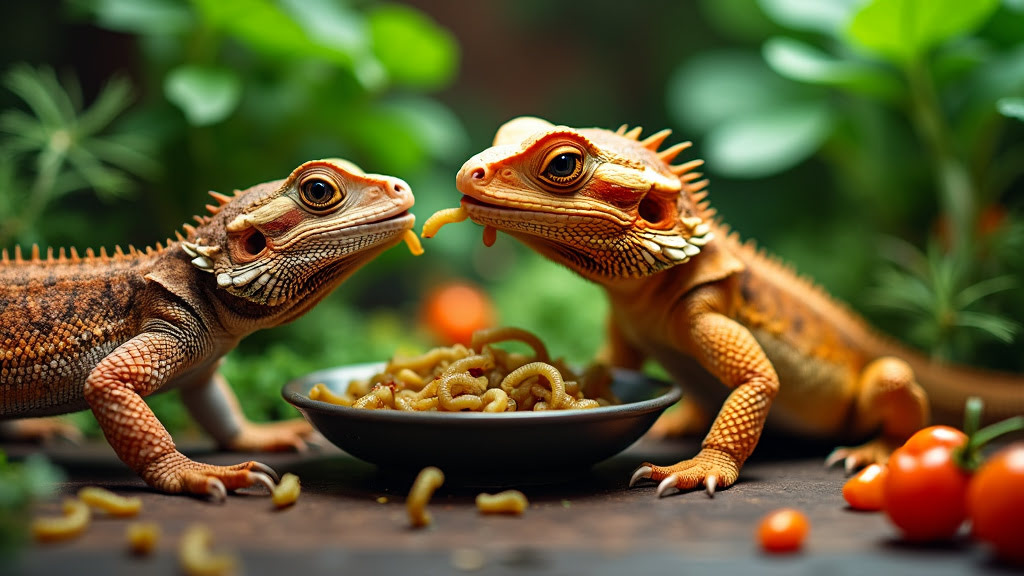Welcome to Dug’s Bugs, where we explore the awesome world of bearded dragons! Today, we’re here to answer a cool question: Can bearded dragons eat Phoenixworms? Let’s find out together!
Understanding What Bearded Dragons Eat
First, let’s look at what our scaly friends like to eat. Bearded dragons are omnivores, which means they enjoy a mix of different foods—veggies, fruits, and yes, protein-packed insects. Here’s a simple breakdown:
Plant-based Foods
- Vegetables: Collard greens, bell peppers, carrots—yum!
- Fruits: Sometimes, berries or slices of apple make a great treat.
- Greens: Spinach, kale, and other leafy greens are important.
Protein-based Foods
- Insects: Crickets, mealworms, and roaches are common choices.
- Worms: This includes our star of the day, Phoenixworms.
- Small Animals: Occasionally, small animals can be offered, but we’ll talk about that another time.
Variety is the spice of life—for both people and bearded dragons. So, keep their diet diverse to give them all the nutrients they need.
What Are Phoenixworms?
Phoenixworms, also known as black soldier fly larvae, are a fantastic addition to your bearded dragon’s menu. But why?
Nutritional Profile of Phoenixworms
Phoenixworms come loaded with benefits:
- High in Calcium: Essential for bone health.
- Moderate Protein Content: Great for muscle growth.
- Low in Fat: These little guys won’t make your dragon pudgy.
Benefits of Feeding Phoenixworms to Bearded Dragons
Now, let’s dig into why Phoenixworms are so great for reptiles.
Nutritional Advantages
- High Calcium-to-Phosphorus Ratio: Perfect for strong bones and avoiding metabolic bone disease.
- Rich in Lauric Acid: This helps boost your dragon’s immune system. Germs, beware!
Here’s a little story: I started feeding Phoenixworms to my bearded dragon, Draco, about six months ago. Since then, Draco’s energy levels have skyrocketed, and his scales have become shiny and healthy. Plus, he’s even more excited at feeding time.
Ease of Care and Storage
Phoenixworms are easy to care for. Unlike crickets that hop around your house or roaches that might give you the creeps, Phoenixworms are neat and easy to store.
How to Feed Phoenixworms to Bearded Dragons
So, you’re convinced that Phoenixworms are great, but how should you feed them to your bearded dragon?
Determining the Right Portion Size
The amount of Phoenixworms you should feed depends on your dragon’s age and size:
- Young Dragons: About 5-10 Phoenixworms per meal.
- Adult Dragons: 10-20 Phoenixworms per meal.
Ensuring a Balanced Diet
Remember, Phoenixworms are awesome, but they shouldn’t be the only source of nutrition:
- Veggies: Make sure to include a good mix of greens and root veggies.
- Other Insects: Variety is key. Mix in crickets, mealworms, and others.
Methods of Feeding Phoenixworms
There are a few ways to feed these little wrigglers to your bearded dragon:
- Hand-feeding: Great for bonding, but can get messy.
- Using a Dish: Keeps things clean and lets your dragon eat at their own pace.
Personally, I prefer placing them in a dish. It’s less messy, and Draco enjoys munching at his leisure.
Precautions and Considerations
While Phoenixworms are generally safe and beneficial, you should always be careful when introducing new foods into your dragon’s diet.
Monitor Your Bearded Dragon’s Reaction
Watch your beardie’s behavior and stool. Any changes could indicate a dietary imbalance or intolerance.
Signs of Overfeeding or Dietary Imbalance
- Weight gain or lethargy can indicate overfeeding.
- Runny stools or lack of appetite may signal an issue.
If you notice any of these signs, it might be time to consult with a vet.
Common Questions About Bearded Dragons and Phoenixworms
How often should I feed Phoenixworms to my bearded dragon?
To keep a balanced diet, you can offer Phoenixworms a few times a week. They make a great supplement to the regular diet but shouldn’t replace other foods.
Can Phoenixworms replace other insects in the diet?
Even though Phoenixworms are very nutritious, they should not completely replace other insects. Variety is important for a balanced diet.
Are there any risks with feeding Phoenixworms?
Risks are minimal, but it’s still important to watch your dragon for any bad reactions. Always get worms from a reputable source (hint: like Dug’s Bugs!).
Conclusion
Feeding Phoenixworms to your bearded dragon can offer many benefits, from boosting their immune system to promoting healthy bones. But like with any pet care, moderation and watching carefully are key. Always make sure your bearded dragon’s diet is balanced and right for them.
Enjoy feeding time and watch your dragon thrive! Remember, if you have any concerns about your pet’s health or diet, it’s always good to consult a vet. Until next time, happy feeding from Dug’s Bugs!
Further Reading and Resources
For those wanting to learn more about bearded dragon care, here are some useful readings and resources:
- Books on varied diets for bearded dragons
- Contact information for exotic pet veterinarians

